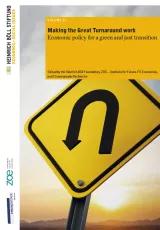This publication series aims at contributing to the emergence of a transformative economic thinking, integrating environmental, social, and economic dimensions, after the wreckage of neoliberal economic thought that clearly has reached its date of expiry. It is the product of a collaboration of the Heinrich-Böll-Stiftung, the ZOE Institute for future-fit economies, and Finanzwende Recherche.

When this series was conceived in autumn 2021, the economic policy environment was quite different. Policy-makers focussed on the challenges of implementing the Paris Agreement while overcoming the scars left by the Covid-19 pandemic. COP26 in Glasgow was a global event that attracted many heads of state and government.
It was in this context that we started a series of three roundtables among economists and political scientists from both sides of the North Atlantic on how to transform our economies to meet the Paris Agreement’s climate goals while addressing inequality and stabilising the financial system. We called this the “Great Turnaround” of our economies, which currently are moving at high speed towards a crash with planetary boundaries.
As a background to the roundtables, we asked some participants to contribute short papers on certain aspects of the multifaceted challenges implied in the “Great Turnaround”. In the process, drafts of the papers received comments from other participants.
This publication aims at contributing to the emergence of a transformative economic thinking, integrating environmental, social, and economic dimensions, after the wreckage of neoliberal economic thought that clearly has reached its date of expiry.
It is the product of a collaboration of the Heinrich-Böll-Stiftung, the ZOE Institute for future-fit economies, and Finanzwende Recherche. Jonathan Barth took the lead in conceptualising the contributions.
We owe a big debt of gratitude to Adam Tooze, who kindly chaired the roundtable series and helped to convene a really fascinating set of innovative authors and thinkers. Our thanks go furthermore to all the authors who penned a series of truly insightful articles. Sarah Ribbert (hbs) and Jan Siebert (ZOE) managed the whole process with admirable diligence, while Robert Furlong provided valuable support as the copy editor.


